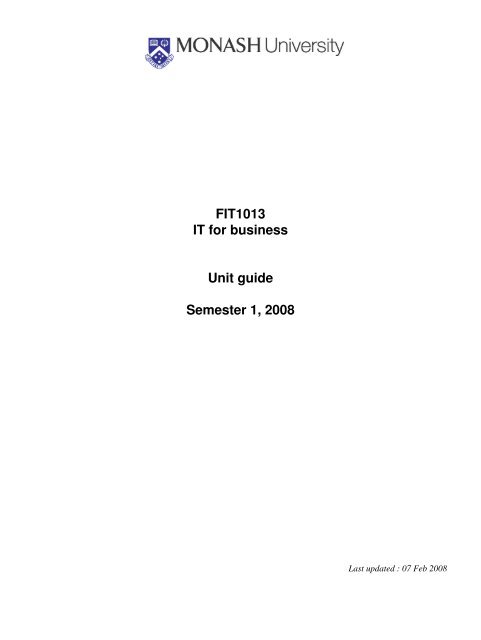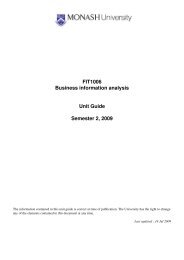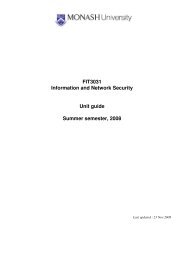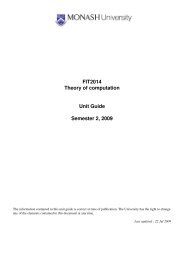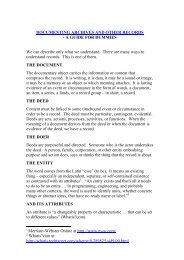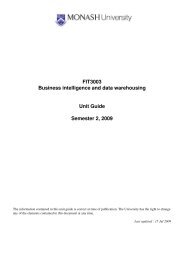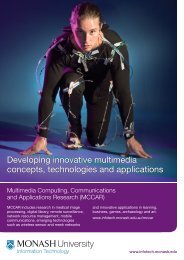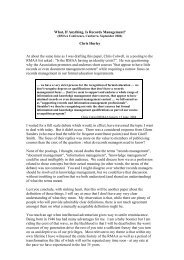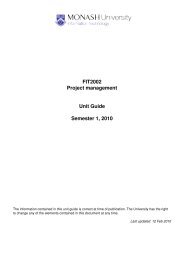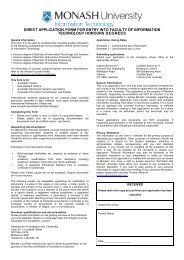FIT1013 IT for business Unit guide Semester 1, 2008 - Faculty of ...
FIT1013 IT for business Unit guide Semester 1, 2008 - Faculty of ...
FIT1013 IT for business Unit guide Semester 1, 2008 - Faculty of ...
You also want an ePaper? Increase the reach of your titles
YUMPU automatically turns print PDFs into web optimized ePapers that Google loves.
<strong>F<strong>IT</strong>1013</strong><strong>IT</strong> <strong>for</strong> <strong>business</strong><strong>Unit</strong> <strong>guide</strong><strong>Semester</strong> 1, <strong>2008</strong>Last updated : 07 Feb <strong>2008</strong>
Table <strong>of</strong> Contents<strong>F<strong>IT</strong>1013</strong> <strong>IT</strong> <strong>for</strong> <strong>business</strong> - <strong>Semester</strong> 1 , <strong>2008</strong>.............................................................................................................1<strong>Unit</strong> leader :......................................................................................................................................................1Lecturer(s) :......................................................................................................................................................1Clayton................................................................................................................................................1Introduction....................................................................................................................................................................2<strong>Unit</strong> synopsis.................................................................................................................................................................2Learning outcomes.........................................................................................................................................................2Workload.......................................................................................................................................................................2<strong>Unit</strong> relationships...........................................................................................................................................................2Prerequisites......................................................................................................................................................2Relationships....................................................................................................................................................2Continuous improvement...............................................................................................................................................3Student Evaluations.......................................................................................................................................................3<strong>Unit</strong> staff - contact details..............................................................................................................................................4<strong>Unit</strong> leader........................................................................................................................................................4Lecturer(s) :......................................................................................................................................................4Teaching and learning method.......................................................................................................................................5Tutorial allocation.............................................................................................................................................5Communication, participation and feedback....................................................................................................5<strong>Unit</strong> Schedule...................................................................................................................................................5<strong>Unit</strong> Resources...............................................................................................................................................................6Prescribed text(s) and readings.........................................................................................................................6Recommended text(s) and readings..................................................................................................................6Required s<strong>of</strong>tware and/or hardware..................................................................................................................6Equipment and consumables required or provided..........................................................................................6Study resources.................................................................................................................................................6Library access...................................................................................................................................................6Monash University Studies Online (MUSO)....................................................................................................7Assessment....................................................................................................................................................................8<strong>Unit</strong> assessment policy.....................................................................................................................................8Examinations....................................................................................................................................................8University and <strong>Faculty</strong> policy on assessment................................................................................................................9Due dates and extensions..................................................................................................................................9Late assignment................................................................................................................................................9Return dates......................................................................................................................................................9Plagiarism, cheating and collusion...................................................................................................................9Register <strong>of</strong> counselling about plagiarism.......................................................................................................10Non-discriminatory language.........................................................................................................................10Students with disabilities................................................................................................................................11Deferred assessment and special consideration..............................................................................................11
•<strong>F<strong>IT</strong>1013</strong> <strong>IT</strong> <strong>for</strong> <strong>business</strong> - <strong>Semester</strong> 1 , <strong>2008</strong><strong>Unit</strong> leader :Yeo Ai CheoLecturer(s) :ClaytonYeo Ai Cheo<strong>F<strong>IT</strong>1013</strong> <strong>IT</strong> <strong>for</strong> <strong>business</strong> - <strong>Semester</strong> 1 , <strong>2008</strong> 1
••••••<strong>F<strong>IT</strong>1013</strong> <strong>IT</strong> <strong>for</strong> <strong>business</strong> - <strong>Semester</strong> 1 , <strong>2008</strong>IntroductionWelcome to <strong>F<strong>IT</strong>1013</strong> <strong>IT</strong> <strong>for</strong> Business <strong>for</strong> semester 1, <strong>2008</strong>. This 6 point unit is designed to provide s<strong>of</strong>tware skills<strong>for</strong> F<strong>IT</strong> students. It is specifically required <strong>for</strong> placement <strong>of</strong> BBIS IBL students, and provides <strong>business</strong> oriented <strong>IT</strong>skills to non-F<strong>IT</strong> students who take this unit as an elective.<strong>Unit</strong> synopsisIn this unit students will gain hands-on experience in using the most commonly used <strong>business</strong> application s<strong>of</strong>twarepackages. The s<strong>of</strong>tware used in the unit are Micros<strong>of</strong>t Excel and Micros<strong>of</strong>t Access. The unit also provides studentswith an understanding <strong>of</strong> the concepts underlying the s<strong>of</strong>tware.Learning outcomesAt the completion <strong>of</strong> this unit students should:Be pr<strong>of</strong>icient in use <strong>of</strong> standard database and spreadsheet s<strong>of</strong>tware <strong>for</strong> <strong>business</strong> applicationsHave an understanding <strong>of</strong> the relational database modelHave a basic knowledge <strong>of</strong> VBAWorkloadWorkload commitments are:two-hour lecturetwo-hour laboratorya minimum <strong>of</strong> 2-3 hours <strong>of</strong> personal study per one hour <strong>of</strong> contact time in order to satisfy the reading andassignment expectations.<strong>Unit</strong> relationshipsPrerequisitesNone.RelationshipsThe unit is a first year core unit in the IBL Stream <strong>of</strong> the Bachelor <strong>of</strong> Business In<strong>for</strong>mation Systems. It may betaken as an elective in other programs where you have satisfied the prerequisites and course rules permit.Introduction 2
<strong>F<strong>IT</strong>1013</strong> <strong>IT</strong> <strong>for</strong> <strong>business</strong> - <strong>Semester</strong> 1 , <strong>2008</strong>Continuous improvementMonash is committed to ‘Excellence in education' and strives <strong>for</strong> the highest possible quality in teaching andlearning. To monitor how successful we are in providing quality teaching and learning Monash regularly seeksfeedback from students, employers and staff. Two <strong>of</strong> the <strong>for</strong>mal ways that you are invited to provide feedback arethrough <strong>Unit</strong> Evaluations and through Monquest Teaching Evaluations.One <strong>of</strong> the key <strong>for</strong>mal ways students have to provide feedback is through <strong>Unit</strong> Evaluation Surveys. It is Monashpolicy <strong>for</strong> every unit <strong>of</strong>fered to be evaluated each year. Students are strongly encouraged to complete the surveys asthey are an important avenue <strong>for</strong> students to "have their say". The feedback is anonymous and provides the <strong>Faculty</strong>with evidence <strong>of</strong> aspects that students are satisfied and areas <strong>for</strong> improvement.Student EvaluationsThe <strong>Faculty</strong> <strong>of</strong> <strong>IT</strong> administers the <strong>Unit</strong> Evaluation surveys online through the my.monash portal, although <strong>for</strong> somesmaller classes there may be alternative evaluations conducted in class.If you wish to view how previous students rated this unit, please go tohttp://www.monash.edu.au/unit-evaluation-reports/Over the past few years the <strong>Faculty</strong> <strong>of</strong> In<strong>for</strong>mation Technology has made a number <strong>of</strong> improvements to its coursesas a result <strong>of</strong> unit evaluation feedback. Some <strong>of</strong> these include systematic analysis and planning <strong>of</strong> unitimprovements, and consistent assignment return <strong>guide</strong>lines.Monquest Teaching Evaluation surveys may be used by some <strong>of</strong> your academic staff this semester. They areadministered by the Centre <strong>for</strong> Higher Education Quality (CHEQ) and may be completed in class with a facilitatoror on-line through the my.monash portal. The data provided to lecturers is completely anonymous.Monquest surveys provide academic staff with evidence <strong>of</strong> the effectiveness <strong>of</strong> their teaching and identify areas <strong>for</strong>improvement. Individual Monquest reports are confidential, however, you can see the summary results <strong>of</strong>Monquest evaluations <strong>for</strong> 2006 at http://www.adm.monash.edu.au/cheq/evaluations/monquest/pr<strong>of</strong>iles/index.htmlContinuous improvement 3
<strong>F<strong>IT</strong>1013</strong> <strong>IT</strong> <strong>for</strong> <strong>business</strong> - <strong>Semester</strong> 1 , <strong>2008</strong><strong>Unit</strong> staff - contact details<strong>Unit</strong> leaderYeo Ai CheoLecturer(s) :Yeo Ai Cheo<strong>Unit</strong> staff - contact details 4
<strong>F<strong>IT</strong>1013</strong> <strong>IT</strong> <strong>for</strong> <strong>business</strong> - <strong>Semester</strong> 1 , <strong>2008</strong>Teaching and learning methodTutorial allocationYou should register <strong>for</strong> laboratories using Allocate+ (http://allocate.cc.monash.edu.au/aplus/apstudent).Communication, participation and feedbackMonash aims to provide a learning environment in which students receive a range <strong>of</strong> ongoing feedback throughouttheir studies. You will receive feedback on your work and progress in this unit. This may take the <strong>for</strong>m <strong>of</strong> groupfeedback, individual feedback, peer feedback, self-comparison, verbal and written feedback, discussions (on lineand in class) as well as more <strong>for</strong>mal feedback related to assignment marks and grades. You are encouraged to drawon a variety <strong>of</strong> feedback to enhance your learning.It is essential that you take action immediately if you realise that you have a problem that is affecting your study.<strong>Semester</strong>s are short, so we can help you best if you let us know as soon as problems arise. Regardless <strong>of</strong> whetherthe problem is related directly to your progress in the unit, if it is likely to interfere with your progress you shoulddiscuss it with your lecturer or a Community Service counsellor as soon as possible.<strong>Unit</strong> ScheduleWeek Topic Key dates1 Excel2 Excel3 Excel4 Excel5 VBAMid semester break6 VBA Excel Assignmentdue - 11 April7 VBA8 VBA9 Access10 Access11 Access12 Access VBA Assignment due- 23 May13 RevisionTeaching and learning method 5
••••<strong>F<strong>IT</strong>1013</strong> <strong>IT</strong> <strong>for</strong> <strong>business</strong> - <strong>Semester</strong> 1 , <strong>2008</strong><strong>Unit</strong> ResourcesPrescribed text(s) and readingsMicros<strong>of</strong>t Office Access 2003, Adamski and Finnegan Comprehensive version Course TechnologyMicros<strong>of</strong>t Office Excel 2003, Parsons, Oja, Agel<strong>of</strong>f & Carey Comprehensive version Course TechnologyThese textbooks are available from the Monash University Bookshops as a single wrapped copy.Text books are available from the Monash University Book Shops. Availability from other suppliers cannot beassured. The Bookshop orders texts in specifically <strong>for</strong> this unit. You are advised to purchase your text book early.Recommended text(s) and readingsThe recommended reading list <strong>for</strong> this unit is available at http://www.lib.monash.edu/resourcelists.Required s<strong>of</strong>tware and/or hardwareOffice XP (Excel 2003 and Access 2003)Equipment and consumables required or providedStudents may use the facilities available in the computing labs. In<strong>for</strong>mation about computer use <strong>for</strong> students isavailable from the <strong>IT</strong>S Student Resource Guide in the Monash University Handbook.Study resourcesStudy resources we will provide <strong>for</strong> your study are:unit <strong>guide</strong> outlining admistrative in<strong>for</strong>matioin <strong>for</strong> the unitlecture slidestutorialsassignment specificationsThese will be made available through MUSO (Monash University Studies Online).Library accessThe Monash University Library site contains details about borrowing rights and catalogue searching. To learn moreabout the library and the various resources available, please go to http://www.lib.monash.edu.au. Be sure to obtaina copy <strong>of</strong> the Library Guide, and if necessary, the instructions <strong>for</strong> remote access from the library website.<strong>Unit</strong> Resources 6
••<strong>F<strong>IT</strong>1013</strong> <strong>IT</strong> <strong>for</strong> <strong>business</strong> - <strong>Semester</strong> 1 , <strong>2008</strong>Monash University Studies Online (MUSO)All unit and lecture materials are available through MUSO (Monash University Studies Online). Blackboard is theprimary application used to deliver your unit resources. Some units will be piloted in Moodle.You can access MUSO and Blackboard via the portal (http://my.monash.edu.au).Click on the Study and enrolment tab, then Blackboard under the MUSO learning systems.In order <strong>for</strong> your Blackboard unit(s) to function correctly, your computer needs to be correctly configured.For example :Blackboard supported browserSupported Java runtime environmentFor more in<strong>for</strong>mation, please visithttp://www.monash.edu.au/muso/support/students/downloadables-student.htmlYou can contact the MUSO Support by: Phone: (+61 3) 9903 1268For further contact in<strong>for</strong>mation including operational hours, please visithttp://www.monash.edu.au/muso/support/students/contact.htmlFurther in<strong>for</strong>mation can be obtained from the MUSO support site:http://www.monash.edu.au/muso/support/index.htmlIf your unit is piloted in Moodle, you will see a link from your Blackboard unit to Moodle athttp://moodle.med.monash.edu.au.From the <strong>Faculty</strong> <strong>of</strong> In<strong>for</strong>mation Technology catgeory, click on the link <strong>for</strong> your unit.Monash University Studies Online (MUSO) 7
•<strong>F<strong>IT</strong>1013</strong> <strong>IT</strong> <strong>for</strong> <strong>business</strong> - <strong>Semester</strong> 1 , <strong>2008</strong>Assessment<strong>Unit</strong> assessment policyWeekly tutorials - 10%Excel assignment -10%Excel VBA assignment - 20%Examination - 60%To pass the unit, a student must obtain:- 40% or more in the examination and- 40% or more in the non-examination assessment and- an overall unit mark <strong>of</strong> 50% or moreExaminationsExaminationWeighting : 60%Length :Type ( open/closed book ) : Closed bookAssessment 8
<strong>F<strong>IT</strong>1013</strong> <strong>IT</strong> <strong>for</strong> <strong>business</strong> - <strong>Semester</strong> 1 , <strong>2008</strong>University and <strong>Faculty</strong> policy on assessmentDue dates and extensionsThe due dates <strong>for</strong> the submission <strong>of</strong> assignments are given in the previous section. Please make every ef<strong>for</strong>t tosubmit work by the due dates. It is your responsibility to structure your study program around assignmentdeadlines, family, work and other commitments. Factors such as normal work pressures, vacations, etc. are seldomregarded as appropriate reasons <strong>for</strong> granting extensions. Students are advised to NOT assume that granting <strong>of</strong> anextension is a matter <strong>of</strong> course.Requests <strong>for</strong> extensions must be made to the unit lecturer at least two days be<strong>for</strong>e the due date. You will be askedto <strong>for</strong>ward original medical certificates in cases <strong>of</strong> illness, and may be asked to provide other <strong>for</strong>ms <strong>of</strong>documentation where necessary. A copy <strong>of</strong> the email or other written communication <strong>of</strong> an extension must beattached to the assignment submission.Late assignmentLate assignment will be accepted using the following sliding scale:No <strong>of</strong> Days Late Percentage <strong>of</strong> Grade1 80%2 60%3 40%4 20%5 0%Return datesStudents can expect assignments to be returned within two weeks <strong>of</strong> the submission date or after receipt, whicheveris later.Assessment <strong>for</strong> the unit as a whole is in accordance with the provisions <strong>of</strong> the Monash University Education Policyat http://www.policy.monash.edu/policy-bank/academic/education/assessment/We will aim to have assignment results made available to you within two weeks after assignment receipt.Plagiarism, cheating and collusionPlagiarism and cheating are regarded as very serious <strong>of</strong>fences. In cases where cheating has been confirmed,students have been severely penalised, from losing all marks <strong>for</strong> an assignment, to facing disciplinary action at the<strong>Faculty</strong> level. While we would wish that all our students adhere to sound ethical conduct and honesty, I will askyou to acquaint yourself with Student Rights and Responsibilities(http://www.infotech.monash.edu.au/about/committees-groups/facboard/policies/studrights.html) and the <strong>Faculty</strong>University and <strong>Faculty</strong> policy on assessment 9
<strong>F<strong>IT</strong>1013</strong> <strong>IT</strong> <strong>for</strong> <strong>business</strong> - <strong>Semester</strong> 1 , <strong>2008</strong>regulations that apply to students detected cheating as these will be applied in all detected cases.In this University, cheating means seeking to obtain an unfair advantage in any examination or any other written orpractical work to be submitted or completed by a student <strong>for</strong> assessment. It includes the use, or attempted use, <strong>of</strong>any means to gain an unfair advantage <strong>for</strong> any assessable work in the unit, where the means is contrary to theinstructions <strong>for</strong> such work.When you submit an individual assessment item, such as a program, a report, an essay, assignment or other piece <strong>of</strong>work, under your name you are understood to be stating that this is your own work. If a submission is identicalwith, or similar to, someone else's work, an assumption <strong>of</strong> cheating may arise. If you are planning on working withanother student, it is acceptable to undertake research together, and discuss problems, but it is not acceptable tojointly develop or share solutions unless this is specified by your lecturer.Intentionally providing students with your solutions to assignments is classified as "assisting to cheat" and studentswho do this may be subject to disciplinary action. You should take reasonable care that your solution is notaccidentally or deliberately obtained by other students. For example, do not leave copies <strong>of</strong> your work in progresson the hard drives <strong>of</strong> shared computers, and do not show your work to other students. If you believe this may havehappened, please be sure to contact your lecturer as soon as possible.Cheating also includes taking into an examination any material contrary to the regulations, including any bilingualdictionary, whether or not with the intention <strong>of</strong> using it to obtain an advantage.Plagiarism involves the false representation <strong>of</strong> another person's ideas, or findings, as your own by either copyingmaterial or paraphrasing without citing sources. It is both pr<strong>of</strong>essional and ethical to reference clearly the ideas andin<strong>for</strong>mation that you have used from another writer. If the source is not identified, then you have plagiarised work<strong>of</strong> the other author. Plagiarism is a <strong>for</strong>m <strong>of</strong> dishonesty that is insulting to the reader and grossly unfair to yourstudent colleagues.Register <strong>of</strong> counselling about plagiarismThe university requires faculties to keep a simple and confidential register to record counselling to students aboutplagiarism (e.g. warnings). The register is accessible to Associate Deans Teaching (or nominees) and, whererequested, students concerned have access to their own details in the register. The register is to serve as a record <strong>of</strong>counselling about the nature <strong>of</strong> plagiarism, not as a record <strong>of</strong> allegations; and no provision <strong>of</strong> appeals in relation tothe register is necessary or applicable.Non-discriminatory languageThe <strong>Faculty</strong> <strong>of</strong> In<strong>for</strong>mation Technology is committed to the use <strong>of</strong> non-discriminatory language in all <strong>for</strong>ms <strong>of</strong>communication. Discriminatory language is that which refers in abusive terms to gender, race, age, sexualorientation, citizenship or nationality, ethnic or language background, physical or mental ability, or political orreligious views, or which stereotypes groups in an adverse manner. This is not meant to preclude or inhibitlegitimate academic debate on any issue; however, the language used in such debate should be non-discriminatoryand sensitive to these matters. It is important to avoid the use <strong>of</strong> discriminatory language in your communicationsand written work. The most common <strong>for</strong>m <strong>of</strong> discriminatory language in academic work tends to be in the area <strong>of</strong>gender inclusiveness. You are, there<strong>for</strong>e, requested to check <strong>for</strong> this and to ensure your work and communicationsare non-discriminatory in all respects.Plagiarism, cheating and collusion 10
•••<strong>F<strong>IT</strong>1013</strong> <strong>IT</strong> <strong>for</strong> <strong>business</strong> - <strong>Semester</strong> 1 , <strong>2008</strong>Students with disabilitiesStudents with disabilities that may disadvantage them in assessment should seek advice from one <strong>of</strong> the followingbe<strong>for</strong>e completing assessment tasks and examinations:<strong>Faculty</strong> <strong>of</strong> In<strong>for</strong>mation Technology Student Service staff, and / oryour <strong>Unit</strong> Coordinator, orDisabilities Liaison <strong>Unit</strong>Deferred assessment and special considerationDeferred assessment (not to be confused with an extension <strong>for</strong> submission <strong>of</strong> an assignment) may be granted incases <strong>of</strong> extenuating personal circumstances such as serious personal illness or bereavement. In<strong>for</strong>mation and <strong>for</strong>ms<strong>for</strong> Special Consideration and deferred assessment applications are available athttp://www.monash.edu.au/exams/special-consideration.html. Contact the <strong>Faculty</strong>'s Student Services staff at yourcampus <strong>for</strong> further in<strong>for</strong>mation and advice.Students with disabilities 11


